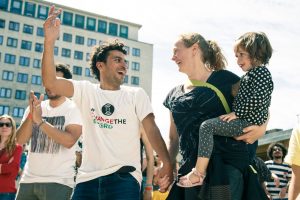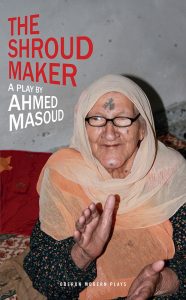They come, when Gaza is on the news, like pigeons gathering around a piece of bread or leftover sandwich in the park. Then they leave quickly, their wings flapping, as if nothing had happened there. It’s all over. They offer their thoughts and words of encouragement. The endless texts flood the phone, the WhatsApp inbox is full of messages from friends asking when we can meet, have a drink, and talk. They are all there for the duration of the attack – of the funeral.
But when it’s all over and the TV screens no longer play images of battered Gaza, you are left alone, the wake is over, the dead are buried, and everyone goes back to business. You sit in your living room and try to make sense of it all for the tenth time in a few years. You breathe heavily, a sigh of relief that family have survived another attack, that none of them is physically hurt.
Life starts going back to normal, you go back to tweeting, writing a Facebook post, speaking at a public event, meeting friends, smoking lots of shisha, and talking politics. Hamas brags about another victory, Israel shows off the targets they’ve destroyed, and we go back to following news on the unity discussions followed by another anniversary of the establishment of a political party and then another.
And all through this time, a hole inside your body starts to grow bigger and bigger. You can’t talk about it anymore. You don’t know where you are or how you fit into the whole situation. So, you write a play or a novel or another article, maybe this one. Everyone wants to know more about the situation, they would like to understand it. So you write.
However, they only want to understand what they already know. They want to read a story, a different one, a human one, as if we were some sort of Greek Tragedy. And you do it, you tell of the young man shot on the Gaza border, of the young paramedic killed while trying to save others, the journalist who was injured, the old man who can’t see his grandchildren, the grandmother whose lover returned from exile after decades, the boy coming of age, a woman cheating on her husband, checkpoints, waiting, travel. But they are all the stories from there.
The Palestinians are all waiting for the next Mahmoud Darwish, the next Ghassan Kanafani or Edward Said. And those in the political life are yearning for the new Yasser Arafat. The art organizations want a good-looking, nice, successful artist from Ramallah who looks brilliant in the media.
And all through this you can’t travel back home to Gaza to see the family, to remind yourself of who you really are, a refugee like most people, someone who has had a chance to survive and have a better life. The border is either closed or run badly, the prison of Gaza is easy to get into but hard to get out of. It’s like committing any crime, but this time it’s only the crime of seeing family and loved ones. And your half-English daughter asks you if you ever had parents. You wonder and contemplate where you fit in all of this and whether what you do is worth doing or if there’s a point to the whole thing.
Brexit debate it is then. I must give my opinion on Twitter and declare my loyalty to the border-free world (well, Europe only), support the Labour Party. Meet with Palestinian friends in London, crawling from one Middle Eastern event to the other, to a lecture by white men talking about Palestine, to an exhibition, an art gallery. To a European artist and their incredible work on Gaza and the West Bank, to Banksy’s latest stunt in the West Bank and his Walled Off Hotel. (I have yet to meet a Palestinian who’s stayed there.) Then spend the whole evening talking politics in pubs. The hangover of occupation is terrible, it lasts a long time. Even if you are out of Palestine and no longer have to face it every day. No paracetamol can help, nor can any vitamin or medicine cure the pain in the head caused by injustice.

Yet the only thing that remains is Palestine, despite their ideas, their political views, despite friends and foes. The land is still there, an extension of us wherever we go. We can almost smell it in the cup of coffee we drink every morning, in the smell of za’atar when we can get it. In the taste of the badly made maglouba* we invite friends to taste, the bunch of olives we get when someone comes from the West Bank. When we travel to the region, to Jordan, Egypt, or Lebanon. You suddenly breathe deeply with a big smile on your face because suddenly you remember who you are – a piece of this land. You go to the border between Jordan and Palestine and try to cross but you are turned back by the Israelis because you are from Gaza. It hurts like a tug in the gut. You want to shout in their faces, but you don’t because you know they can do anything to you.
Deep inside you know that you are right and they are wrong, that all you are trying to do is to be a normal human being despite what they think and what they would like to do and which negotiations or ceasefire talks they are entering. You turn back having reminded yourself of who you are, and you calm down a bit, feeling the peace of knowing that you’ve tried your best and that you can never be blamed.
And life goes back to normal and you don’t write this article, you feel lucky. Until the next round.
*Literally “upside-down,” a dish with fried vegetables, rice, and chicken, layered in a pot and turned over onto a serving platter – the better it keeps its shape, the prouder the cook.



